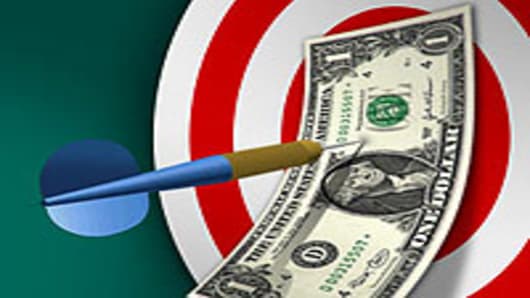Though historically low interest rates have been at the core of much of the rally across asset classes in 2010, that doesn't mean anticipated higher rates in 2011 will stop investors from making money.
Strategists remain bullish on the stock market, with forecasts of 10 to 20 percent gains abounding. But market pros remain mostly sanguine about bonds as well, even though rising rates and accompanying inflation usually eat away at the value of fixed-income instruments.
The trick, they say, will be to be more selective.
"I would certain want to underweight Treasurys," Kevin Giddis, president of Morgan Keegan's fixed income capital markets division, said in a CNBC interview. "You've got to be cautious from totally getting out of bonds. Stay with the shorter duration, stay with the wide-spread securities and you'll be fine."
That opinion meshes with a general feeling that bonds won't be quite the easy play they were in 2010, as an awful fourth-quarter performance began to indicate. Strategists believe shorter-term instruments will work better as rates rise and inflation becomes more of an issue.
Interest rates are likely to rise as pressure builds from a recuperating economyand the continued influx of government debt into the marketplace.
"Basically we're employing the same strategy as we did in '06," said John Lekas, portfolio manager at the Leaders Short Term Bond Fund. "What we did was gravitate to high-quality floating-rate instruments."
Corporate bonds from bigger names such as ING , Citigroup and Ford Motor Credit feature low prices, high coupon payments and minimal duration risk, Lekas said. Those types of bonds provide better value than other instruments tied to interest rates such as Treasury Inflation Protected Securities.
However, some strategists are cautioning clients to begin pulling back on some bond exposure while not eliminating bonds entirely.
"You should be overweight stocks, underweight bonds," said David Keegan, JPMorgan Funds chief market strategist. "Just don't go all out or all in. There are lots of things that could trip us up here."
On the stocks side, concern about rising rates should be met with a portfolio that contains not only with stocks bought for growth but also with solid dividends that can be counted on should trading get a little whippy during the course of the year.
"Instead of rolling short bonds, we think you're going to get the best bet by buying stocks that have good yields," said Randy Bateman, CIO at Huntington Funds.
Among Bateman's recommendations are Carbo Ceramics , Alliance Res Partners, Quaker Chemical and Garmin.
Similar strong-dividend companies are likely to become more popular among portfolio managers, many of whom believe inflation is on the way. According to the most recent fund managers survey from Bank of America Merrill Lynch, some 61 percent now expect higher inflation in the next 12 months, up sharply from 48 percent in November.
Inflation expectations also are represented in a gauge that BofAML formulated which "troughed in February 2009, and has been steadily increasing since then. The change was largely driven by commodity price increases, but wage and price growth over the last 12 months has been below trend," quantitative strategist Savita Subramanian said in a research note to clients.
"Energy and Tech dominate the group of companies whose relative returns are helped by inflation," Subramanian wrote. "Consumer-related companies dominate the group of stocks whose relative returns are hurt by inflation."
To be sure, not everyone is worried about rates.
The debate over the effect of rates and some level of inflation is essentially split into two camps: One believes the rise in rates is a good thing and reflective of economic strength, while the other believes it is a negative that will choke off the economic recovery.
For the moment, the benchmark 10-year Treasury note yield remains parked around 3.30-3.40 percent, well below April levels that sent stocks into a tailspin.
"I would have a problem with this market if the 10-year presses over 4 percent. Otherwise, I'm not really worried," said Michael Cohn, chief investment strategist at Global Arena Investment Management in New York. "The market seems to be overbought and there seems to be too many bullish people right now. But for the moment I'm willing to ignore that until rates press higher than their recent range."



